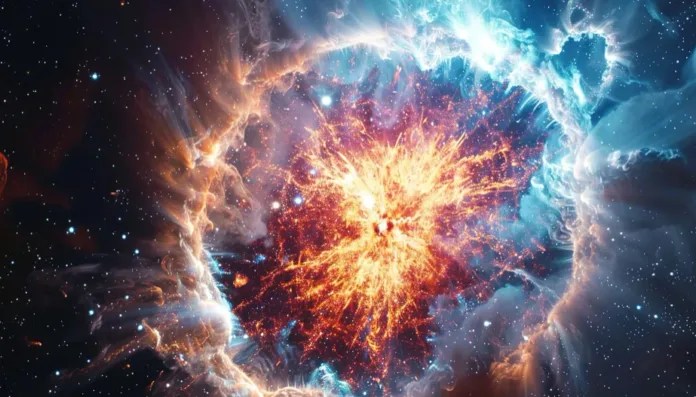Astronomers propose the theory of a cyclical universe, where the Big Bang could be a repeating cycle
The mystery of what came before the Big Bang and how our universe came into existence has long fascinated scientists. Now, a groundbreaking theory emerging from recent studies could offer an answer, suggesting that the universe could be part of an endless cycle of cosmic births and deaths.
For decades, astronomers have been looking back to the farthest reaches of the universe, attempting to uncover clues about the origins of everything. With the aid of increasingly advanced technology, scientists have been able to peer into the past, observing galaxies so distant that their light has taken billions of years to reach Earth. But as they journey back, they encounter a wall—anything before the Big Bang remains a mystery, as the explosion that created our universe erased all traces of what came before.
Yet, a new approach may hold the key. Instead of looking to the past, scientists are now looking forward, theorising that by understanding how the universe might end, we could unlock secrets about how it began.
Professor Henry Tye, a theoretical physicist from Cornell University, is leading the charge in this innovative field of research. He and his team have been using simulations to model the future of the universe, running the cosmic clock forward billions of years to predict its final fate. Their work suggests that the universe’s expansion is accelerating, not slowing down as once thought, and that dark energy, which makes up about 70% of the universe, could hold the answers.
Dark energy was first proposed in the late 1990s to explain the unexpected acceleration in the expansion of the universe. While astronomers initially thought dark energy was constant, recent observations have suggested it may be evolving over time. Two major cosmic surveys, the Dark Energy Survey (DES) and the Dark Energy Spectroscopic Instrument (DESI), have provided detailed maps of the universe and helped uncover this startling evolution in dark energy.
Embed from Getty Images
Based on these new insights, Professor Tye and his colleagues have proposed an audacious theory involving a hypothetical particle called an axion. Axions, which are incredibly difficult to detect, might be contributing to the accelerating expansion of the universe. According to their theory, axions were once the dominant factor in driving the universe apart, but as space expanded, these particles spread out, diminishing their influence. This shift, Tye argues, allowed the cosmological constant—a force once thought to be the driver of expansion—to flip and begin drawing everything back together.
The team’s theory suggests that in the future, when the axions’ influence has waned, gravity will take over and the universe will begin to collapse, leading to what could be known as the “Big Crunch.” According to Dr. Hoang Nhan, a co-author of the study, this collapse could begin as soon as 11 billion years from now, with the final Big Crunch occurring approximately eight billion years later.
While the Big Crunch is an exciting prospect for cosmologists, it raises profound questions about the nature of time and space. As matter and energy are drawn back together, the boundaries between gravity and quantum mechanics—two fundamental forces that govern the cosmos—will collide, creating a situation that scientists are still struggling to understand.
The idea of a cyclical universe—where the Big Bang leads to a Big Crunch, and then another Big Bang—was first proposed by Einstein in 1930, but it wasn’t until recent advances in cosmology that this theory gained serious attention. The “Big Bounce” theory suggests that our universe could undergo an endless series of expansions and contractions, forever repeating the cycle of creation and destruction.
Though the Big Bounce offers a compelling explanation for both the beginning and potential end of the universe, there are still significant obstacles to confirming this theory. As Professor Tye notes, while scientists can predict the end of the universe, precisely how it will end remains an open question—much like predicting a person’s life expectancy without knowing the exact moment of their death.
This research could ultimately lead to a deeper understanding of the universe’s origins and its ultimate fate. However, the question remains: will we ever truly understand what happened before the Big Bang, or will the mysteries of the cosmos remain forever out of reach?
